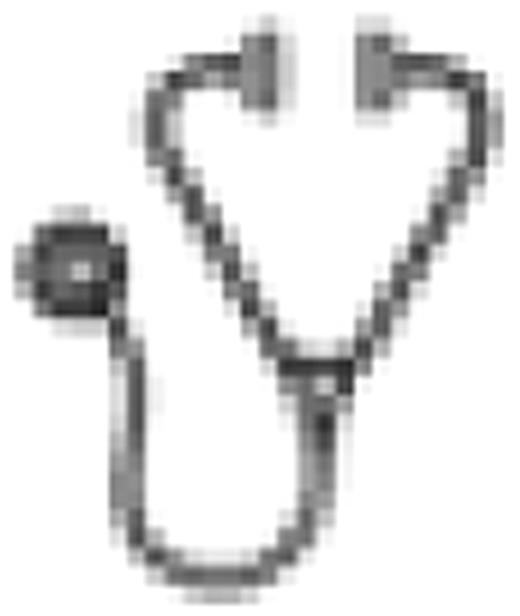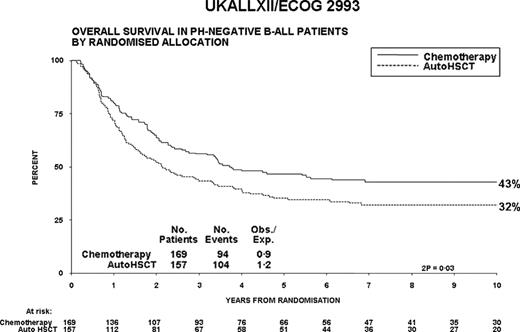Abstract
Abstract 524
The International UKALLXII/E2993 trial enrolled 2091 pts with newly diagnosed adult ALL between 1993 and 2006. Patients received 2 months of combination induction chemotherapy followed by an intensification course of high dose methotrexate and L-asparaginase after which pts were randomized to autologous hematopoietic stem cell transplant (HSCT) or consolidation and maintenance chemotherapy. Patients <55 years of age with a matched sibling donor were assigned myeloablative allogeneic HSCT (Goldstone, et al, Blood 2008; 111:1827). Here we report a detailed analysis of 1,229 pts from this trial with B-ALL, excluding Philadelphia-chromosome-positive patients. The median age was 30 years (range 14–65) and 59% were male. The median WBC was 9.2×109/L (range 0.1–930) and 73% of pts had a WBC <30 × 109/L. CNS involvement was present in 4% of pts at diagnosis. Comprehensive centralized immunophenotyping was performed in 372 of the 409 (91%) ECOG pts enrolled and initial analysis demonstrated pro-B/pre-pre-B in 17%, early pre-B in 52%, pre-B in 14%, either early pre-B or pre-B in 6%, mature B in 2% and B-lineage, not otherwise specified, in 9%. Outcomes were similar between patients with immunophenotyping data and those without. The complete remission (CR) rate was 93% and there were 4% induction deaths. The overall survival (OS), event-free survival (EFS), relapse risk (RR) and non-relapse mortality (NRM) at 5 years for the overall group is shown in the table. There were no significant differences in CR rate, OS, EFS, RR or NRM for the immunophenotypic subgroups. There was better OS and EFS with less relapse and similar risk of NRM for pts randomized to chemotherapy as compared with autologous HSCT (Figure 1). In the matched sibling donor-no donor comparison, OS and EFS were improved, RR was less and NRM was higher in the donor group (Figure 2). Cytogenetic analysis confirmed that patients with t(4;11) (n=77, 8% total), t(8;14) (n=19, 2% total), a complex karyotype (≥5 abnormalities in the absence of an established chromosomal abnormality) (n=38, 5% total), or low hypoploidy/near triploidy (n=41, 5% total) had an inferior OS and patients with high hyperdiploidy had a superior OS when compared to other patients.
In conclusion, this is the largest series of B-ALL in uniformly treated adults ever reported and confirms the superior outcome of patients randomized to chemotherapy as compared with autologous HSCT and shows that patients with a matched sibling donor have an improved survival over patients without a donor. No difference in CR rates or outcome was noted for patients with different immunophenotypic subtypes of B-ALL. Future improvements in outcome of pts with B-ALL will rely on the addition of new agents such as B cell monoclonal antibodies and improvements in allogeneic HCT.
Outcomes at 5 years of follow-up
| . | n . | CR rate (%) . | OS . | EFS . | RR . | NRM . |
|---|---|---|---|---|---|---|
| Overall | 1229 | 93 | 42 | 37 | 50 | 21 |
| Pro-B/pre-pre-B | 63 | 92 | 36 | 34 | 54 | 21 |
| Early pre-B/pre-B | 268 | 93 | 40 | 34 | 54 | 21 |
| Age ≤ 35 years | 746 (61%) | 96 | 53 | 45 | 45 | 16 |
| Chi square p | <0.0001 | <0.0001 | <0.0001 | <0.0001 | <0.0001 | |
| Age >35 years | 483 (39%) | 89 | 32 | 26 | 59 | 30 |
| Randomized to autologous HSCT | 157 | 35 | 31 | 66 | 10 | |
| Log rank p | 0.03 | 0.01 | 0.01 | NS | ||
| Randomized to chemotherapy | 169 | 47 | 42 | 55 | 8 | |
| Matched sib donor | 344 | 52 | 48 | 30 | 32 | |
| Chi square p | 0.05 | 0.03 | <0.001 | <0.001 | ||
| No Donor | 474 | 45 | 41 | 55 | 10 |
| . | n . | CR rate (%) . | OS . | EFS . | RR . | NRM . |
|---|---|---|---|---|---|---|
| Overall | 1229 | 93 | 42 | 37 | 50 | 21 |
| Pro-B/pre-pre-B | 63 | 92 | 36 | 34 | 54 | 21 |
| Early pre-B/pre-B | 268 | 93 | 40 | 34 | 54 | 21 |
| Age ≤ 35 years | 746 (61%) | 96 | 53 | 45 | 45 | 16 |
| Chi square p | <0.0001 | <0.0001 | <0.0001 | <0.0001 | <0.0001 | |
| Age >35 years | 483 (39%) | 89 | 32 | 26 | 59 | 30 |
| Randomized to autologous HSCT | 157 | 35 | 31 | 66 | 10 | |
| Log rank p | 0.03 | 0.01 | 0.01 | NS | ||
| Randomized to chemotherapy | 169 | 47 | 42 | 55 | 8 | |
| Matched sib donor | 344 | 52 | 48 | 30 | 32 | |
| Chi square p | 0.05 | 0.03 | <0.001 | <0.001 | ||
| No Donor | 474 | 45 | 41 | 55 | 10 |
Values are % except n and p values. CR=complete remission, OS=overall survival, EFS=event-free survival, RR=relapse risk, NRM=non-relapse mortality NS=not significant. The p values represent the difference between age groups for the first comparison, randomized to autologous HSCT versus chemotherapy for the second comparison and between matched sibling donor and no donor for the third comparison.
No relevant conflicts of interest to declare.

This icon denotes an abstract that is clinically relevant.
Author notes
Asterisk with author names denotes non-ASH members.



This feature is available to Subscribers Only
Sign In or Create an Account Close Modal